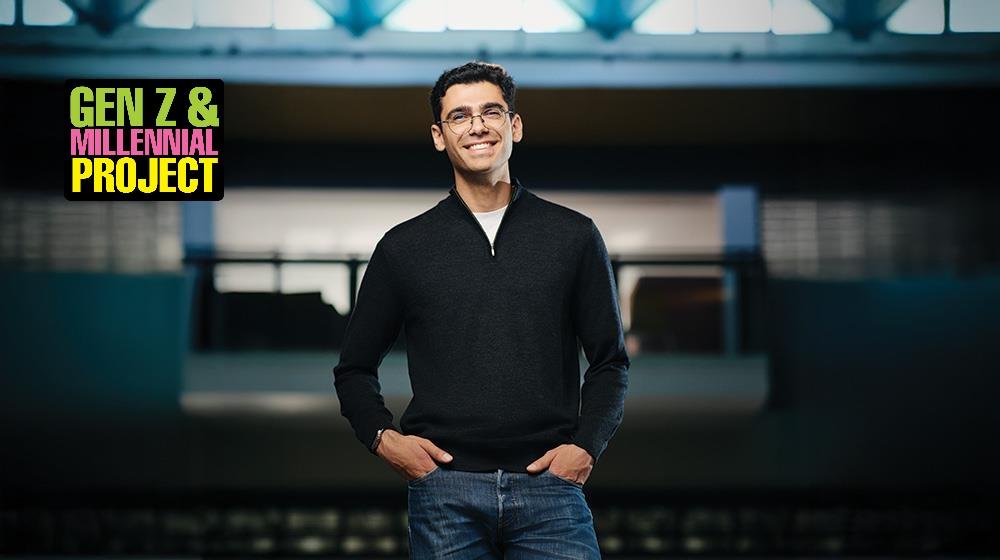Technology always rewrites the rules. The printing press supercharged the spread of ideas, the internet collapsed distances and today Generative AI is fundamentally changing the way we work.
Aristotelis Economides recently moved across Google to work at Google DeepMind on Gemini’s AI infrastructure and, in this exclusive interview, he shares his personal views about what people still misunderstand about the technology, its impact on jobs and whether we’re any closer to the day when AI will do more than just our routine desk work.
You’ve been with Google since 2022 and, a few months ago, you moved to Google DeepMind, working on Gemini’s AI infrastructure. How’s that shift been for you? Has the pace, ambition or mindset changed, compared to your earlier work at Google?
Google DeepMind definitely runs faster. It feels like a much smaller crew constantly sprinting towards new finish lines. The division isn’t clean, of course. There is extensive collaboration with the rest of Google. As for me personally, I wouldn’t say that anything has changed. I just feel that I belong better at DeepMind.
So, what does a typical day look like for you these days? And more importantly, what exactly are you building?
My work revolves around deploying models, tuning them for business requirements and keeping them running smoothly. Some days, I partner with special company efforts to set up custom models for research or internal products.
Other days I tune inference engines – the machinery we need to run AI as a system – for specific purposes. Do you need responses fast or maximum throughput per minute? Are you sending long prompts with extensive context? Do you need brief or detailed outputs? Each choice involves trade-offs with different implications.
Then there are those days when you spend endless hours chasing a bug that defies all logic. It’s all part of the job. DeepMind’s culture encourages extreme ownership and high agency, so the most accurate description of a “typical” day is “doing whatever needs to get done”.
Let’s talk a bit about Gemini itself. Where do you see it sitting in the GenAI race right now? Is there a clear focus in terms of the innovation pipeline?
Gemini launched in February 2023, just a few months after ChatGPT. I think that the company’s response speed was incredible. The first Gemini models weren’t great but now we’re competing at the very top. I can’t really speak about DeepMind’s strategic focus – you should watch Demis Hassabis’ latest podcast for that – but I find Google’s original mission statement genuinely adaptable: to organise the world’s information and make it universally accessible and useful.
You’ve written AI for Everyone, a short e-book aimed at demystifying GenAI for a non-technical audience. What are people still getting fundamentally wrong about Generative AI?
That little e-book was my attempt at explaining large language models (LLMs). The algorithms behind AIs like Gemini and ChatGPT. LLMs aren’t people. They predict the next word based on previous ones. Every week, reputable media publish articles about AI threatening, lying or manipulating. This isn’t just false; it distracts from what we should really be thinking about: how to integrate this technology into our society to maximise its benefit to humanity.
On the subject of public discourse, the conversation around GenAI and the labour market has become quite dramatic, with some people saying that it will wipe out jobs and others viewing it as a productivity miracle. So, where do you stand: is it a threat, a benefit or just one very big unknown?
I use AI every day, mostly for coding. It’s very useful for completing small pieces or handling tedious parts. At home, I love asking Gemini to play devil’s advocate against my writing or uploading articles and discussing the author’s views.
I don’t think AI will have a negative impact on the job market. Today’s printing press technology is extremely faster and automatic compared to 1925 but do people in book publishing work less? No. Their work has transformed into something else. AI will have similar implications.
People naturally get anxious during rapid change and AI’s improvement has been steep. There will be changes in the workforce but there will still be plenty of work for everyone – we just don’t know what the new jobs look like yet. It’s like asking a farmer in the early 20th century to predict the jobs of our day – they’d have had a really hard time.
Reflecting on how things have changed in the last 50-100 years, I don’t think that my grandmother, who was operating a flour mill in the fields, had better work conditions than I do. Today is so much better and I’m really excited about the tomorrow we’re building. Whether AI is a threat or a benefit depends on how we choose to use it, like any other tool. The great thing is that we get to choose.
GenAI can already do a pretty good impression of an intern or even a junior dev on a good day. What does that mean for young people just entering the workforce? Do we need to rethink the whole corporate ladder?
GenAI can’t really replace junior devs today. Most tasks aren’t concrete and isolated enough for AI to tackle them successfully. The effort it takes to give the necessary context to AI is much higher than giving context to a junior dev. Juniors are much better at asking clarifying questions than AI and, most importantly, any effort invested in a dev results in compounding improvements in the future. If I spend a week mentoring a junior dev, they’ll be substantially more effective the next week, which isn’t the case for today’s AI systems.
This isn’t to say that AI isn’t already massively useful. As I said earlier, I use it all the time. But we still have some interesting problems to solve. When AI can automate junior-level work, it will be a great day! Often, what we consider junior-level work is mostly mundane tasks. With AI taking care of those, we can develop young talents’ skills and critical thinking much earlier in their careers. Will we need to rethink the corporate ladder? Probably but today’s ladder was created from constraints of the past; it was not designed to enable young people yearning to make an impact in the world.
If you could fix one thing in the GenAI conversation – a myth, a misuse or a buzzword you’d like to ban – what would it be?
I’m not a fan of banning but I would love to help some people stop worrying about pre-determined doom scenarios and instead, actively shape the future with intention and purpose.
We’ve seen how Moore’s Law started hitting physical limits once we couldn’t shrink transistors much further. Do you think LLMs are heading toward a similar ceiling? Is there a natural upper limit to what they can do?
We can’t make transistors smaller but that didn’t stop us from making faster and better machines. Physical limits exist for everything but I think we’re still very far from them.
Today’s approach to building LLMs might hit a ceiling – I’m not an expert enough on this topic to have a confident opinion. But LLMs are unlikely to be the best algorithm we’ll be able to come up with. Humans love solving problems. The harder the problem, the more satisfaction we get. When we hit a ceiling, we will probably do what humans always do: find another way and get the job done.
There’s an idea floating around that LLMs are the first real step towards Artificial General Intelligence (AGI). Do you think that’s technically credible or is it just wishful thinking?
Maybe! LLMs have a surprisingly simple architecture. I’d be genuinely surprised if, in 30 years, we aren’t using significantly more sophisticated techniques.
Everyone’s buzzing about AI agents and multimodal models lately and Gemini’s obviously part of that conversation. From where you sit, what actually matters about these trends? And what’s the next big milestone you think we’ll see?
It’s great that state-of-the-art agents are able to do longer tasks and that models have strong multimodal understanding but I would like them to fix my code and do my laundry! In the end, what matters is whether these systems solve real problems better than older tools or, better yet, let us solve new problems altogether.
The next big milestone will probably come from re-introducing reinforcement learning: training models that learn from their environment. Rich Sutton and David Silver’s recent paper, Welcome to the Era of Experience, sets the right direction. This would be DeepMind returning to its roots. Many of DeepMind’s original contributions, like AlphaGo and AlphaZero, heavily involved reinforcement learning innovations.
Shifting gears, you co-founded HardwareX with your brother, Odysseas Economides, working on smart electronics and IoT. How hands-on are you with the company these days? And what has that experience taught you about trying to build a startup, especially from a place like Cyprus?
I’m not really hands-on with HardwareX. Odysseas carries almost all the load, especially with me in the US. Building a company is generally hard. Focusing on hardware is harder. Doing that on an island with Cyprus’ small market is probably a solid nine out of ten hard!
What do you think is holding back the local startup ecosystem? Is it the usual mix of limited capital, scale and wrong policies – like public universities holding onto spinoff IP – or is there something else going on?
Cyprus’ main constraint is scale and density: a small domestic market limits capital formation, founder networks and customer access. We are also barely more than one million people. If you compare Cyprus with any country of its size or smaller, we rank very high in entrepreneurship metrics, such as investment per capita. We are doing a decent job of attracting foreign entrepreneurs but we could be doing more to convert our own talent into startups.
So, how do we get things moving? What best practices can we take from places like San Francisco to give the local scene a real push?
In the Bay Area, Frederick Terman helped Stanford commercialise research by pushing engineering students to start companies and using his network to help them succeed. With founder-friendly IP, public and defence customers, dense networks and patient capital, Silicon Valley became the world’s most prolific entrepreneurship machine.
Cyprus can adopt parts of that playbook: strengthen the pathways from universities to commercialisation, make the state a first customer and introduce tax reliefs for entrepreneurs and investors.
It also goes without saying that we should rethink IP practices. Some of them are there to ensure proper credit but I think it’s often possible to make everyone feel like they’re winning in a transaction. You just have to be creative about it.
Finally, whether we’re talking about Gemini, AGI or the Cypriot tech scene, if you try to look five years ahead, what’s one thing that you’re genuinely excited about and keeps you up at night?
What most excites me for the years ahead is that we might get into a new era of computing and technology – one where computers finally break free from predetermined functionalities, screens and keyboards. We might get computing technology that helps us in interactive, dynamic ways, freeing us from sedentary, desk-bound, screen-focused jobs.
(Photo by TASPHO)
This interview first appeared in the September edition of GOLD magazine. Click here to view it.
- Project Partners: Bank of Cyprus, Cablenet, European University Cyprus and PwC Cyprus









